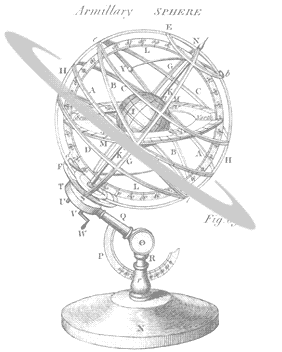

Prof. Jim Schombert
Office: 461 Willamette, 6-5214
Office Hours: drop-in, email 1st please
email: jschombe@uoregon.edu
Course Content:
The past 20 years has seen an explosion in our understanding of the contents, formation and evolution of the Universe. Changes in our fundamental physics, combined with discoveries from space and ground-based telescopes, have led to a radically different model of our place in the Universe and its origins. The field of cosmology is science's newest endeavor into the most basic questions of humankind's existence; where do we come from and what is our fate? Cosmology is the meeting point of observational astronomy, philosophy and particle physics. However, unlike philosophy, cosmology engages Nature providing a foundation based in observation and experience.
The specific goals of this class are to:
Course Organization:
All lectures in this course will be delivered electronically. The lecture pages will be on the Web in HTML (hypertext mark-up language) format so that they are accessible from any computer, either at home or on campus. The address for this course is pages.uoregon.edu/jschombe/ast123.
We are using the computer network in this class for several reasons:
Even though the web notes replace the need for detailed notes, they do not replace your need to attend class. A great deal of material is discussed in lecture that is not in the web notes and will appear on the exams. And difficult concepts in the web lectures will be clarified in class. So please attend.

Use the email system. Often professors only hear from students through office hours, and those students are usually the ones having trouble in the course. When you study or review your notes, send me questions by email. Also email me suggestions and comments about the course, particularly in the first few weeks in order to have an impact during the term.
On-line Quizzes:
In order to get you to engage the lectures, the class has a quiz system at each web lecture. At the bottom of each lecture you will find a "quiz" button. Hit it and take a quiz of 10 questions. You can restart a quiz at any point, take it with open book, notes or web resources. Please do your own work for these quizzes. They are learning exercises and copying answers will only lower your exam score as you will miss critical material.
These quiz questions count the same as an exam question. Your final grade will be based on the exam scores plus quiz scores. Not doing the quizzes will be the same as not taking an exam and subject to a failing grade. You will find that the quiz material comes from the web lectures and things discussed in class.
NOTE, you have only a limited window to take the quiz, the schedule is posted on the class web page (typically you have a few days after the lecture). Miss the date and you will be unable to take the quiz (the point of the quizzes is to get you to study before the exams, hence the deadline). The quiz answers and scores are posted after the deadline. For this reason you cannot submit your quiz answers late. The answers are posted and late submission will not be allowed regardless of the excuse. Do *not* email me about making up quizzes, the answers are posted after the deadline, the answer is no.
Due to the large number of quizzes, it is highly likely that you will miss a quiz deadline or your dog will eat the Internet the night before they are due. Thus, each student will be allowed to drop the three lowest quiz scores for the final grade. If you miss three quizzes, then those three zeros are dropped. If you answer all the quizzes on time, then your three lowest scores will be dropped. If you miss more than three quizzes you will be dropped 1/3 a letter grade (i.e. B+ to B) per group of three that you miss in a step-like fashion (i.e., you miss 1-3 quizzes, no penalty; miss 4-6 quizzes, you lose 1/3 a grade, miss 7-9 quizzes, you lost 2/3's a grade, etc.).
To summarize:
Grading:
Grading will consist of the following:
The three exams are large, difficult multiple choice exams. Each exam covers 1/3 of the course. The exams are designed using material from the lectures *and* textbook, so mastery of both is required for a good grade. Not taking an exam will automatically fail you from the course. It's not very useful to wait till the last minute to study for an exam.
The exams are 100 multiple choice questions covering lectures from the last 1/3 of the course. When you start the exam you will be presented with 100 buttons, red are unanswered, green are completed. Select your answer and push submit (or skip). You can return to any question, at any time within the 120 minutes to change your answer. The amount of time left is displayed in the exam page. When it runs out, the exam will stop, your answers are recorded, no more answers will be accepted. If something goes wrong during the exam, simply go back to the starting link (below) and re-start, all your previous answers are stored and the clock is still running. There is no submit button when you are finished, the exam just times out, all keystrokes are recorded.
The exam is open book/notes. You may use any resource from your computer. However, you may not work in groups. The exam must represent your work and only your work, not a group.
The exam will open the morning of the exam date and close at midnight. Do *not* miss this window. While 120 minutes seems like a long time, it will not be sufficient to look-up each question. You will run out of time and unanswered questions count as zero. I urge you to study as you would for a regular exam and not place faith in your ability to google answers quickly. The questions are constructed based on information in the lectures, in the readings and in the quizzes. With 100 questions, every topic will be covered.
You can *not* start the exam, then change your mind and come back later. Once you start the exam you must complete it in the allocated time. Therefore, make sure you start the exam with a good 2 hour window where you will not be interrupted. If you miss an exam due to illness you must contact me as soon as possible after the exam and before the next exam. You must take the make-up exam *before* the next exam.
Note there is no final exam during final exam week. The three exams taking during the classtime consist of all the exams towards your grade.
Your grade will be based on the sum of the quiz and exam scores. You must maintain an average of greater, or equal, to 45% to pass the course. Above that score, your grade is ranked compared to other students and your grade is assigned based on that rank. The class website has a button to find out what your current grade is, which is activated *after* the first exam. Note that the exams are worth more than the quizzes, failing all the exams will mean you fail the course, regardless of your quiz scores.
Textbook:
There is no assigned textbook for the class, there are assigned readings at the top of every lecture. However, a good on-line textbook (if you feel you need a textbook) is Schneider&Arny, Pathways of Astronomy, any edition is fine. The corresponding Units to each quiz is marked at the top of each quiz; however, the same material is covered in class. The reading assignments that match the lectures are:
| Lecture | Chapter |
|
Lecture 1 Lecture 2 Lecture 3 Lecture 4 Lecture 5 Lecture 6 Lecture 7 Lecture 8 Lecture 8 Lecture 10 Lecture 11 Lecture 12 Lecture 13 Lecture 14 Lecture 15 Lecture 16 Lecture 17 Lecture 18 Lecture 19 Lecture 20 Lecture 21 Lecture 22 Lecture 23 Lecture 24 Lecture 25 Lecture 26 |
Units 10, 11 Units 12, 13 Units 14, 15, 17 Unit 21 Unit 20 Units 21, 22, 23, 24 Unit 24 Unit 68 Unit 50 Unit 70 Unit 75 Unit 77 Unit 74 Units 74, 79 Unit 80 Unit 78 Unit 81 Unit 81 Unit 83 Unit 81 Units 66, 81 Unit 80 Unit 80 Unit 80 Unit 80 Unit 82 |
Academic Honesty:
A recent survey of UOregon upperclassmen has indicated that 91% admit to cheating on a written assignment or exam. Every effort will be made in this class to deter dishonesty through classroom procedures. You are all welcome to work in groups on Homework assignments, however exams must be based on individual work only (i.e. don't look at someone else's exam). It is degrading to impose draconian security measures to enforce honesty. Instead, we will use the honor system in this course and allow each of you to uphold your personal standards of conduct. For those of you who have failed to develop your own ethics, the University has designed the Student Conduct Program. To also help you down the ethical path, anyone caught cheating will recieve an 'F' for the course.
Accommodations:
If you have a disability and anticipate needing accommodations in this course, please see me as soon as possible. And please request that the Counselor for Students with Disabilities (https://aec.uoregon.edu) send a letter verifying your disability.